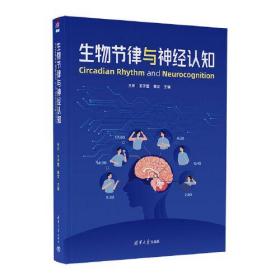
节律与同步
正版保障 假一赔十 可开发票
¥ 51.48 3.3折 ¥ 156 全新
库存45件
广东广州
认证卖家担保交易快速发货售后保障
作者LarryR.Squire[主编]
出版社科学出版社
ISBN9787030280763
出版时间2009-04
装帧精装
开本16开
定价156元
货号6646903
上书时间2024-09-05
- 最新上架
商品详情
- 品相描述:全新
- 商品描述
-
目录
昼夜节律
Circadian Function and Therapeutic Potential of Melatonin in Humans
Circadian Gene Expression in the Suprachiasmatic Nucleus
Circadian Genes and the Sleep-Wake Cycle
Circadian Metabolic Rhythms Regulated by the Suprachiasmatic Nucleus
Circadian Organization
Circadian Organization in Non-Mammalian Vertebrates
Circadian Oscillations in the Suprachiasmatic Nucleus
Circadian Regulation by the Suprachiasmatic Nucleus
Circadian Regulation in Invertebrates
Circadian Rhythm Models
Circadian Rhythms in Sleepiness, Alertness, and Performance
Circadian Rhythms: Influence of Light in Humans
Circadian Systems: Evolution
Clock Gene Regulation of Endocrine Function
Clock Genes and Metabolic Regulation
Entrainment of Circadian Rhythms by Light
Genetic Regulation of Circadian Rhythms in Drosophila
Genetics of Circadian Disorders in Humans
Mammalian Sleep and Circadian Rhythms: Flies
Melatonin Regulation of Circadian Rhythmicity in Vertebrates
Non-Photoreceptor Photoreception
Peripheral Circadian Oscillators
Photoreceptors and Circadian Clocks
Psychiatric Disorders Associated with Disturbed Sleep and Circadian Rhythms.
Serotonin and the Regulation of Mammalian Circadian Rhythms
Shift Work and Circadian Rhythms
Single Cell Neuronal Circadian Clocks
Sleep and Circadian Rhythm Disorders in Human Aging and Dementia
Sleep and Waking in Drosophila
Sleep: Development and Circadian Control
Transcription Control and the Circadian Clock
季节节律
Photoperiodic Regulation of Reproductive Cycles
Seasonal Changes in Night-Length and Impact on Human Sleep
Seasonal Hormonal Changes and Behavior
Seasonal Timing: Neural Mechanisms
睡眠、做梦与清醒
Autonomic Dysregulati0n During REM Sleep
Cataplexy
Coma
Dopamine Control of Arousal
Dream Function
Dreams and Dreaming: Incorporation of Waking Events
Dreams and Nightmares in PTSD
Dreams, Dreaming Theories and Correlates of Nightmares
Endocrine Function During Sleep and Sleep Deprivation
Hibernation
Immune Function During Sleep and Sleep Deprivation
Metabolic Syndrome and Sleep
Napping
Narcolepsy
Nightmares
Parasomnias
Pharmacology of Sleep: Adenosine
Reticular Activating System
Sleep and Circadian Rhythm Disorders in Human Aging and Dementia
Sleep and Sleep States: Gene Expression
Sleep and Sleep States: Hippocampus-Neocortex Dialog
Sleep and Sleep States: Histamine Role
Sleep and Sleep States: Hypothalamic Regulation
Sleep and Sleep States: Network Reactivation
Sleep and Sleep States: PET Activation Patterns
Sleep and Sleep States: Phylogeny and Ontogeny
Sleep and Sleep States: Thalamic Regulation
Sleep Apnea
Sleep Architecture
Sleep Deprivation and Brain Function
sleep Deprivation: Neurobehavioral Changes
Sleep in Adolescents
Sleep in Aging
Sleep Mentation in REM and NREM: A Neurocognitive Perspective
Sleep Oscillations
Sleep Oscillations and PGO Waves
Sleep Research and Sleep Medicine in Historical Perspective
Sleep-Dependent Memory Processing
Sleeping Sickness
Sleep-Wake State Regulation by Acetylcholine
Sleep-Wake State Regulation by Noradrenaline and Serotonin
Stimulant and Wake-Promoting Substances
The AIM Model of Dreaming, Sleeping, and Waking Consciousness
Thermoregulation during Sleep and Sleep Deprivation
原书词条中英对照表
内容摘要
The alternation of light and dark is the most reliable timing cue on our planet, and therefore it is not surprising that the retina has evolved a precise timing mechanism that allows it to anticipate and then to adapt to the more than 1 million-fold change in light intensity during a 24 h period. The retina was the first extra-SCN oscillator to be discovered in mammals. Several studies have now demonstrated that many of the physiological, cellular, and molecular rhythms that are present within the retina are under the control of a circadian clock, or more likely a series of circadian clocks that are present within this tissue (Figure 1). For example, the disk shedding that occurs in the rod photoreceptors is under circadian control. Shedding persists in animals with SCN lesions or a transected optic nerve, indicating its independence from the central circadian pacemaker. Additional studies have reported that sensitivity to light-induced photoreceptor damage is modulated by the circadian clock via a cyclic adenosine monophosphate (cAMP)-dependent pathway. Other important retinal functions, such as visual sensitivity, are also under circadian control. Although results from these studies suggested that retinal physiology was regulated by a circadian clock, they were not sufficient to conclude that an independent circadian pacemaker was located within the retinal tissue. The definitive demonstration of the presence of an autonomous retinal clock in mammals was achieved a few years ago when it was shown that a circadian rhythm of melatonin release persisted in mammalian retinas maintained in culture. In light/ dark cycles, melatonin levels were high during the night and low during the day. In constant darkness, the circadian rhythm of melatonin release free-ran, exhibiting a period close to 24 h. The circadian rhythm of melatonin release in the retina can be entrained by light in vitro and is temperature compensated. Such results demonstrated that the retina can be considered a bona fide circadian pacemaker, since it satisfies the three fundamental properties (i.e., freerunning, entrainment, and temperature compensation) that describe a circadian rhythm.
……
精彩内容
本书原书篇幅巨大,为所有神经科学百科全书之首。由来自世界各地的2400多位专家撰稿人合力打造,覆盖了神经科学全部主要领域。每个词条在收入书中之前均经过顾问委员会的同行评议,词条中均含有词汇表、引言、参考文献和丰富的交叉参考内容。
主编为有名神经科学家、美国神经科学学会前主席LarryR.Squire。内容平易,本科生即可读懂。深度和广度专享,足可满足专家学者的需要。导读版精选原书中的部分主题,按内容重新编排,更适合国内读者购买和阅读。
相关推荐
— 没有更多了 —




















以下为对购买帮助不大的评价